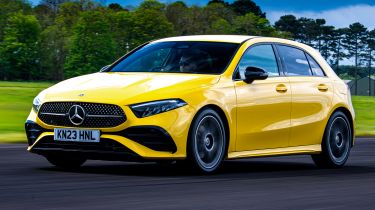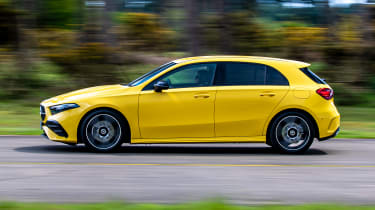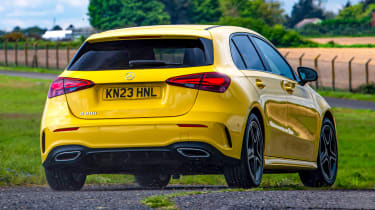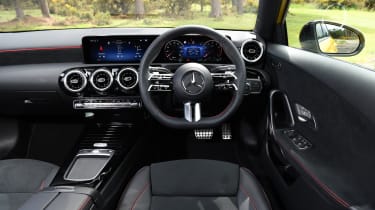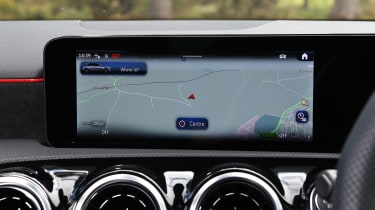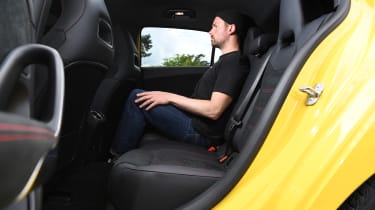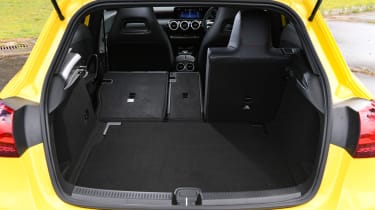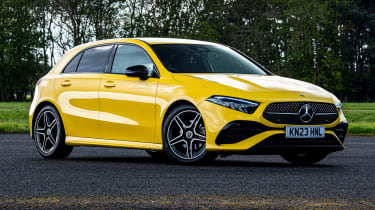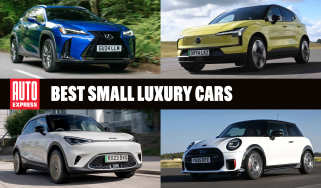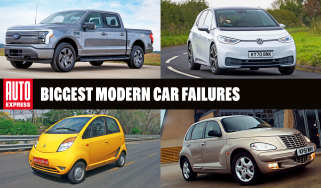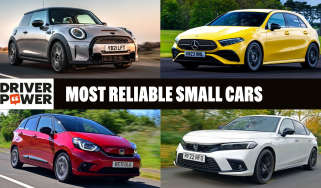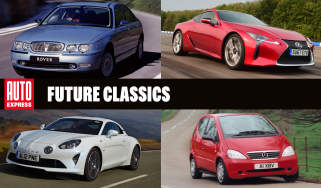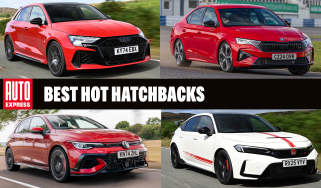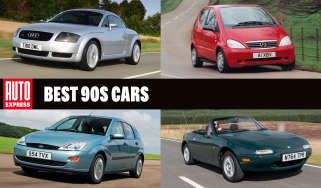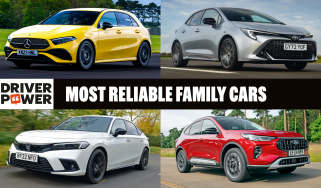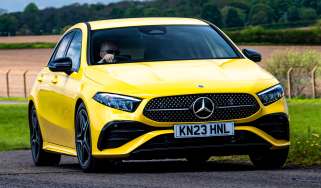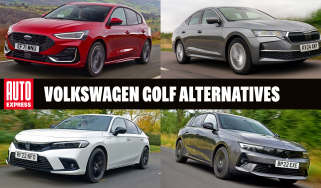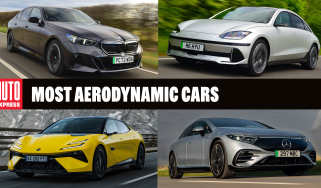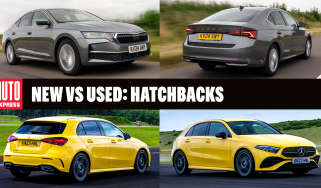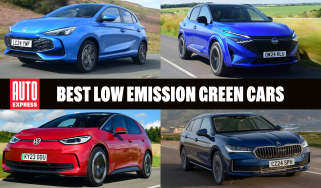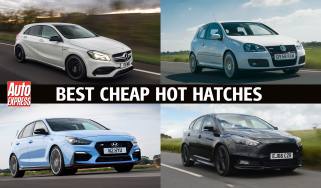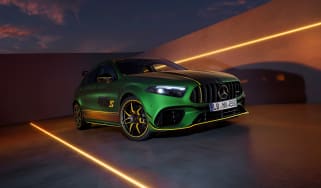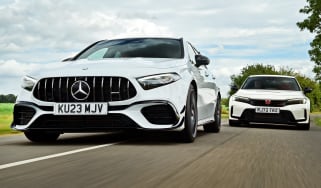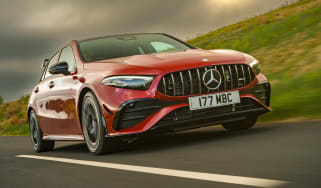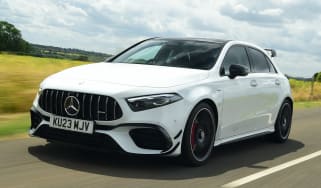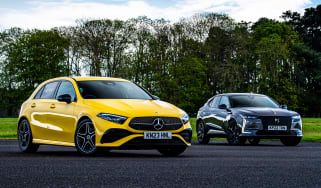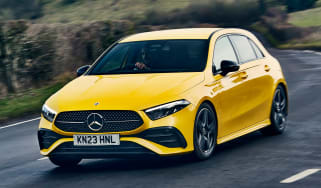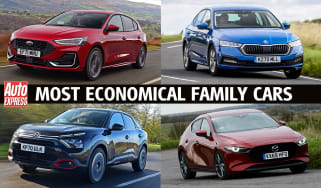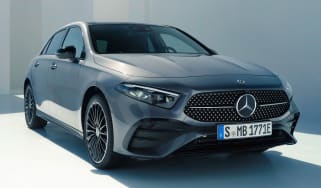Mercedes A-Class review
The Mercedes A-Class is a premium hatch that is full of quality, with great on-board technology and a range of frugal engines

Our opinion on the Mercedes A-Class
The Mercedes A-Class has always been a compact hatch with one major selling point – that three-pointed star on the nose. But while its predecessors all lacked a little substance behind the badge, this latest generation is a genuine contender for class honours.
Step inside and, despite having originally launched back in 2018, the A-Class remains a very classy customer. The interior design and quality is wonderful, and the infotainment system is easy to use. Some rivals are more fun to drive and several are more comfortable, but the A-Class remains very strong both in terms of refinement and efficiency.
About the Mercedes A-Class
The latest Mercedes A-Class is the fourth generation of Mercedes’ smallest car. While the first two examples took on a mini-MPV design direction (with clever, if not particularly desirable, results), the most recent pair have gone for a more conventional five-door hatchback shape in order to compete directly with the BMW 1 Series and Audi A3. It was launched in 2018 and received a far-reaching update in 2022. Mercedes has launched the new CLA saloon using its latest compact car platform tech but there are no plans to replace the A-Class.
All models get a pair of 10.25-inch media screens with MBUX – Mercedes’ multimedia system operated via either the screen, touch-sensitive buttons on the steering wheel, or for certain functions, voice control. Apple CarPlay and Android Auto are both standard on the A-Class as well.
Used - available now

2018 Mercedes
A Class
70,000 milesAutomaticDiesel1.5L
Cash £10,000
2021 Mercedes
A Class
16,064 milesAutomaticPetrol1.3L
Cash £21,927
2018 Mercedes
A Class
44,000 milesManualDiesel1.5L
Cash £10,500
2018 Mercedes
A Class
110,316 milesAutomaticDiesel1.5L
Cash £8,599Engine choices are made up of a pair of petrols in two states of tune, a single diesel engine and a plug-in hybrid petrol. The A 180 and A 200 both use a 1.3-litre turbocharged petrol with mild-hybrid technology, while the A 250 e plug-in hybrid uses the same 1.3-litre but with more electric assistance. The sole diesel, badged A 200 d, gets a 2.0-litre unit.
A manual gearbox is no longer available in the A-Class; both the A 180 and A 200 are available with a seven speed twin-clutch automatic gearbox, while the A 200 d and A 250 e get an eight-speed twin-clutch automatic.
A more spritely AMG A 35 hot hatch is available and uses a 2.0-litre turbocharged petrol four-cylinder, producing 302bhp and 400Nm of torque. Hot hatch fans will love the manic AMG A 45 S, featuring the world's most powerful four-cylinder engine – a bespoke turbocharged 2.0-litre unit with 415bhp.
Mercedes A-Class prices and latest deals
A-Class prices start from around £31,500 for the base Sport Edition trim and the A180 powertrain. The A200 D diesel opens at around £35,500 in Sport Exclusive guise and the A 250 e plug-in hybrid is £41,500 in AMG Line Exclusive trim. For an AMG hot hatch model, you’re looking at £48,000 for the A35 and a sobering £65,000 for the A45 S. You can take your pick of A-Class models on our Buy a Car service right now.
Engines, performance and drive
Pros |
|
Cons |
|
If there’s one aspect of the A-Class that impresses the most from behind the wheel, it’s refinement. On a motorway cruise, it’s class-leading: a 0.25 drag coefficient means that there’s barely a whisper of wind noise. The engines settle down to a barely-audible hum, and the most obvious – but not intrusive – sound comes from the tyres.
Like-for-like, the A-Class is 20kg lighter than the old one, even though it’s grown in every direction. While the handling is an improvement on before, this still isn’t an exciting car. It’s got plenty of grip, but the suspension is biased more closely towards security than fun. Things aren’t helped by steering which has very little feel, though it is precise and its light weight at low speeds makes the A-Class very easy to park.
The model you choose determines the sort of rear suspension set-up you’ll get. Most versions of the A-Class use a torsion beam set-up, however, if you go for the A 180, A 200 or A 200 d engine and upgrade to Premium Plus trim, this adds more sophisticated multi-link rear suspension – the same set-up the high-performance AMG models use. The torsion beam lacks the overall control of the multi-link, but you need to be seriously pressing-on for this to be a noticeable issue.
There is, however, a more tangible difference in ride comfort. Around town, the torsion beam jiggles ever so slightly more over short, sharp bumps, though in reality, the more advanced set-up doesn’t fare much better when compared to class rivals. The A-Class is a car that fidgets over bumps rather than smothering them – particularly on larger wheels.
0-62mph acceleration and top speed
| Model | Power | 0-62mph | Top speed |
| A180 | 134bhp | 9.2s | 134mph |
| A200 | 161bhp | 8.2s | 140mph |
| A250 e | 215bhp | 7.4s | 140mph |
The entry-level A 180 manages 0-62mph in 9.2 seconds with a 134mph top speed, while upgrading to the 161bhp A 200 petrol version sees the sprint time improve to a more sprightly 8.2 seconds and 140mph. All perform fine on paper, then, but the torque deficit relative to the A 200 d means that these A-Class derivatives need working hard at times – effort they hastily announce through a loud, thrashy tone.
Thankfully, the mild-hybrid system in the A 180 and A 200 works very smoothly, cutting the engine out and starting it up again quickly, while smoothing off some of the previous lumpiness in this engine-and-gearbox combination.
The plug-in hybrid A 250 e provides a healthy amount of performance. The car accelerates from 0-62mph in 7.5 seconds thanks to a combination of a 1.3-cylinder 4cyl turbo petrol with an additional electric motor which in total produces 215bhp. In EV mode, it tops out at 87mph, going on to 143mph with combustion power.
The AMG A 35 model produces 302bhp and 400Nm of torque. It will sprint from 0-62mph in 4.7 seconds (4.8 in the saloon version) onto an electronically-limited top speed of 155mph, pegging it close to the VW Golf R. Power is fed to all four wheels through a seven-speed dual-clutch automatic transmission and there are five drive modes to choose from, allowing separate adjustment of elements like the dampers, throttle and gearbox responses.
Engaging the A 35’s most aggressive drive mode transforms the car’s behaviour, feeling composed, grippy and lightning fast. It flatters in a way the old A 45 couldn’t, mimicking the Golf R’s fantastic all-weather ability and adding a welcome degree of involvement. The Golf R is perhaps slightly crisper to drive and feels slightly more agile, but most drivers will be impressed by the A 35's incredible all-weather performance.
The AMG A 45 S takes the honour of the fastest A-Class with a 0-62mph time of 3.9 seconds. Power is fed through an eight-speed auto 'box, while the four-wheel drive system provides an impressive amount of grip.
MPG, CO2 and running costs
Pros |
|
Cons |
|
The strong figures across the standard A-Class range are no doubt partly thanks to a slippery body shape to help the aerodynamics. If you're prioritising efficiency, the plug-in hybrid A 250 e will appeal as Mercedes claims an all-electric range of up to 53 miles – and staggering official combined fuel economy of between 282 and 353mpg.
That latter figure is somewhat meaningless, however, as with frequent charges you could reasonably run this car for months without filling it up with fuel even once. The fact it emits only 23g/km of CO2 will be more relevant to business users, who will save in company car tax but not as much as if they choose a pure electric car.
The A-Class diesel option is still pretty frugal and offers excellent returns from a tank of fuel. The A 200 d achieves a claimed maximum of up to 57.7mpg in both hatchback and saloon form, with CO2 emissions of 130g/km.
The A 180 and A 200 petrol models use 48-volt mild-hybrid tech and a more proactive start-stop system to help with fuel consumption. There's nothing to really separate the A 180 and A 200 in terms of fuel efficiency with both capable of around 45 to 48mpg. Emissions are dependent on which equipment level you choose, but start from 133g/km for the A 180 and 133g/km for the A 200, a small increase in efficiency since the entry-level manual gearbox option was dropped.
Naturally, the performance-oriented AMG A 45 S model is the least efficient of the range, although a claimed 30.7mpg on the combined cycle is still a good return when you consider it produces a staggering 415bhp.
| Model | MPG | CO2 | Insurance group |
|---|---|---|---|
| A180 | 48.7mpg | 133g/km | 20-21 |
| A200 | 48.7mpg | 133g/km | 23-24 |
| A250 e | 353mpg | 23g/km | 32-33 |
Electric range, battery and charging
The plug-in hybrid A-Class uses a 16kWh lithium-ion battery to feed a single electric motor, and offers a pure-electric driving range of up to 53 miles. To get the most out of the A 250 e's hybrid system in terms of both range and fuel economy, you’ll need to charge it as often as possible.
The A 250 e has a maximum charging speed of 11kW, and a 10 to 100 per cent top-up takes under two hours if you use a home wallbox or workplace charger capable of that speed – a domestic three-pin socket will take five and a half hours to do the same job.
Insurance groups
The A 180 falls into insurance groups 19-21, while the A 200 tops out at group 25 in its highest trim level and the A 250 e saloon sits in group 32 or 33, depending on which trim level you go for. The 415bhp AMG A 45 S 4MATIC+ Plus will be even more expensive to insure, sitting in group 41, and the A 35 models a touch less in groups 36-37.
Check if your car needs an MoT and view its complete history with our MoT History Checker...
Depreciation
Buyers have to pay handsomely to own and insure an A-Class, and our latest data suggests residual values after three years and 36,000 miles of motoring are a little behind the curve as well.
The A35 and A45 hot hatches hold their value best with 47 to 48 per cent predicted. The A200d diesel does worst at 41 to 43 per cent and the other models are in between. The BMW 1 Series retains 50 to 54% of its value while the Audi A3 is in the 47 to 51% ball park.
To get an accurate valuation on a specific model check out our free car valuation tool...
Interior, design and technology
Pros |
|
Cons |
|
The fourth-generation A-Class sports a design which amounts to a fairly conservative evolution over the old model. It’s a bit sharper to look at while the lights are pointier and slimmer. The hot AMG versions get a sporty body kit and a lairy wing, but overall it’s a look which will neither set pulses racing nor put off existing customers.
The interior design is the highlight. It’s unique, attractive, well-laid out and feels immaculately put together with lots of soft-touch plastics. The giant leap forward in appearance, however, is thanks in no small part to the fantastic dual-screen MBUX infotainment system – more on that later.
Non-metallic Polar White and Night Black paint hues are standard for the A-Class range, with a handful of other exterior colours available. However, there's not much in the way of other opportunities to personalise your car.
Mercedes offers a selection of trim lines on the A-Class, with a choice of Sport Edition, Sport Executive, AMG Line Executive, AMG Line Premium and Premium Edition, plus two dedicated AMG models: the AMG 35 4MATIC and AMG 45 S 4MATIC+.
All models include cruise control, heated seats, dual-zone climate control, and adaptive LED headlights although the entry-level Sport version makes do with smaller 17-inch alloys, compared to the standard 18-inch wheels on AMG Line Executive and Premium models. Those above get new 19-inch wheel designs.
Sat-nav, stereo and infotainment
Called ‘MBUX’, the A-Class infotainment system is very impressive. All A-Class models now feature a pair of 10.25-inch screens positioned side-by-side for an almost continuous widescreen display: the screen in front of the driver shows various driving information and data, while the central display caters for the infotainment functions.
The main menu has three large widgets for phone connectivity, navigation and
audio functions. Swiping through them is slick – not quite smartphone fast, but still responsive. Meanwhile, loading times are fine, but the navigation system speed is pegged back by loading three routes at once. It would be quicker if it started with the optimum route, then provided alternatives.
The screen itself has an excellent resolution, though, so Apple CarPlay and Android Auto look sharp. The driver’s screen is just as good. It’s in effect split into three, allowing the driver to show the trip, navigation or driving functions in a number of combinations.
The steering wheel also gets touch-sensitive panel controls like those found in the flagship Mercedes S-Class, while higher-spec models feature augmented-reality navigation. When approaching junctions, the system displays images from a forward-facing camera onto the screen, and in real time superimposes arrows onto the display which inform the driver of the turning they need to take.
Practicality, comfort and boot space
Pros |
|
Cons |
|
The A-Class is available as a five-door hatch with the saloon having been replaced by the new Mercedes CLA. Up front, the driving position is great – there’s plenty of adjustment for both the seat and the steering wheel, so it’s easy to get comfy. Mercedes has made an effort to slim down the plastic trim around the pillars, and as a result visibility, particularly over the shoulder, has improved. However, it can feel a little claustrophobic in the back compared to some of the A-Class’ rivals because of the front seats – their shape and size block out a lot of the light.
In terms of cubby spaces, the A-Class is pretty standard for the class. There’s a big central storage bin, a couple of cup holders ahead of the infotainment touch pad, and a smartphone-sized space at the base of the dash. The front door pockets are roomy enough for a large bottle, but those in the back are small.
It's worth noting that while refinement is good on most models, the A 35's large 19-inch wheels roar on the move – a trait that's pretty tiring on longer journeys. The car's sporty bias also means it feels a bit fidgety on the move, detracting from long-distance comfort.
Dimensions and size
Dimensions comparison | |||
| Model | Mercedes A-Class | Audi A3 | BMW 1 Series |
| Length | 4,428mm | 4,352mm | 4,319mm |
| Width | 1,992mm | 1,984mm | 2,081mm |
| Height | 1,452mm | 1,441mm | 1,434mm |
| Wheelbase | 2,729mm | 2,630mm | 2,670mm |
| Boot space | 355 litres | 425 litres | 380 litres |
The A-Class hatchback measures 4,428mm long, 1,796mm wide and 1,423mm tall. That’s 136mm longer than the old car, and larger than the A3 Sportback in every dimension – the extra 91mm in length could make a difference when parking in tight spaces. The 2,729mm wheelbase is also longer than the A3’s 2,640mm space between its axles.
Seats & passenger space
Mercedes states that there’s more elbow and headroom in the back compared to the previous A-Class. However, a lack of knee room means that when filled with four six footers, it’s more cramped than the Audi. Headroom is fine, unless you’re in the raised middle seat. That central berth is narrow too, so it’s not a comfortable place to sit.
On the plus side, it’s really easy to fit a child seat. The ISOFIX mounts are clearly exposed by plastic openings, and the doors open fairly wide.
When we pitted the Mercedes A-Class head-to-head against the DS 4 E-Tense in a twin test, we found that the A-Class offers more headroom and its cabin is wider too, measuring 1,425mm compared to 1,390mm in the DS 4. That said, the DS 4 is more generous when it comes to knee room, giving 575mm to 836mm depending on the position of the driver’s seat compared to 563 to 817mm in the A-Class.
Boot space
One criticism of the previous model is that the boot wasn’t just smaller than most rivals, but hard to make use of due to a narrow opening. The new car addresses both of these issues to an extent – the opening is a useful 20cm wider, and the total volume is up to 355 litres. That’s a nominal 25 litres fewer than front-wheel drive A3 models, but more than quattro-equipped cars. There’s also a tiny bit of underfloor storage for hiding away smaller items.
The rear seat backs fold in a 40/20/40 split, but the boot floor isn’t quite flat. With the seats down and the car loaded to the roof, capacity increases to 1,195 litres – still 5 litres less than the Audi. The A 250 e saloon meanwhile can pack between 345 to 1,125 litres with the seats raised and lowered respectively, while the conventional combustion models, without a battery occupying some of their luggage space, extend that to 405 litres seats-up and 1,200-1,210 litres with the seats folded.
We also measured the boot space of the A-Class ourselves when we pitted it against the DS 4 E-Tense in our twin test. We found that while the DS 4’s boot is wider than the A-Class’s, the Mercedes gained points back by having a longer boot and lower load height too, which make it easier to load heavier items in.
Boot space comparison | |||
| Length | Width | Lip height | |
| Mercedes A-Class | 817mm | 1,038mm | 642mm |
| DS 4 | 782mm | 1,098mm | 729mm |
Towing
The A 180 petrol is rated to tow 1,400kg, while the A 200, A 200 d and A 250 e have a maximum towing capacity of 1,600kg, and AMG models 1,800kg. The A-Class isn’t your typical towcar, though.
Reliability and safety
Pros |
|
Cons |
|
All versions of the A-Class come loaded with safety kit: an active bonnet, forward collision warning, autonomous emergency braking (AEB), auto headlights, and a glut of airbags are standard throughout the range. Also included is ‘Mercedes me connect’; an in-built system which not only keeps the driver within easy contact of approved breakdown services, but is also able to contact the emergency services in the event of a serious accident.
The Mercedes A-Class was assessed by Euro NCAP in 2018 and achieved a maximum five-star safety rating. Adult and child occupant protection scored an excellent 96 and 91 per cent, respectively.
The A-Class finished in an impressive 11th place overall in our 2025 Driver Power customer satisfaction survey with a score of just under 88 per cent.
Buying and owning
- Best buy: Mercedes A200 Sport Executive
There’s a lot to be said for the A 250 e plug-in hybrid if you can charge it regularly and do a lot of trips under 50 miles using the electric range because it will prove highly cost-effective to run. The same goes for the Mercedes-AMG A 35 hot hatch, which is a hugely capable driver’s car that’s a lot more accessible than the full-blown A 45 S.
Our best buy pick, however, is the A200 which gives you the same efficiency as the entry-level A180 with useful extra performance for only £1,500 more. Sport Executive trim gives you sharp looks and a good range of kit without bumping the price up too far.
Mercedes A-Class alternatives
The classic alternatives to the A-Class are the BMW 1 Series and the Audi A3 but you also have models like the DS 4 which aim to give the same sort of premium experience in a hatchback. The electric Polestar 2 and Genesis GV60 are further options and then you have more mainstream hatches like the VW Golf and Peugeot 308.
Mercedes A-Class owner reviews
Here’s what owners in the 2024 Driver Power survey thought of the Mercedes A-Class.
| What they like | What they don't like |
| “Overall, this is a great small saloon in terms of design and quality. It’s just what you expect of the brand.” | “There should be the option of a spare wheel. I got a puncture and had to wait four hours for assistance.” |
| “Mercedes cars are not cheap to buy, but they are impressive, so on balance they’re good value.” | “My A180 is underpowered and lacks mid-range oomph. Next time I’ll buy something with a bit more power.” |
| “The voice control is up there with the best. We’ve had 10 cars in the last six years, so we’ve tried plenty.” | “The satellite-navigation system in my A-Class is by far the worst that I have ever owned.” |
| “In automatic mode, the gearbox is very smooth and responsive, and it’s just as good in manual mode.” | “The ride quality is harsh and the car is very unsettled over small bumps and minor road imperfections.” |
| “My A-Class goes like hell, stops really well and holds the road superbly. There really is nothing not to like.” | “The service interval should be set at every two years for low-mileage drivers, rather than every year.” |
| “All-round visibility is excellent, thanks to the car’s rear-view camera. Also, it’s in a drop-down housing, so it stays clean.” | |
| “The different driving modes mean that it adapts to your driving style, so the steering is set up just right whatever the driving environment. The ride quality is smooth, too.” | |
| “Looks and feels well made; it’s as good as the bigger, more costly models. The only bad point with the choice of cabin materials is the gloss piano black, which attracts fingerprints.” | |
| “The A-Class isn’t a large car, but rear legroom is perfectly good, even for longer journeys, and the boot is a good size, too. The number of cubbyholes isn’t very generous, but it’s adequate and perfectly fine for the needs of most people.” |
Used and nearly new
This fourth generation Mercedes A-Class launched in 2018 so it’s now in plentiful supply on the used car market. The car has proven extremely popular with buyers with its combination of style, technology and a premium badge helping keep used values strong. The A-Class was the UK’s fifth best-selling car in 2020 and fourth in 2021, so there’s no shortage of choice out there.
Mercedes A-Class history
Mercedes A-Class Mk3: 2013-2018
The third generation A-Class arrived in 2013 as a complete departure from the Mercedes compact car philosophy that had gone before. A traditional hatchback in shape, it offered sharp design inside and out but was criticised for a firm ride and a lack of practicality. Big sales numbers mean there are lots of used models to choose from. Read our full Mercedes A-Class Mk3 buyer’s guide here...
Mercedes A-Class Mk2: 2004-2012
Following the same MPV themes as the original Mercedes A-Class the Mk2 car was very much an update on that formula and remained at odds with what rival manufacturers were doing in the compact premium family car space at the time. Sturdy build quality, low running costs and cabin space were strengths but it was better around town than on the open road.
Mercedes A-Class Mk1: 1998-2004
The first Mercedes A-Class with a unique design with a tall shape and a small footprint maximising interior space and manoeuvrability. The design was groundbreaking, a new approach to premium compact cars and they still make good, cheap family runabouts today.
Frequently Asked Questions
We think the latest Mercedes A-Class is one of the best premium hatchbacks you can buy right now, thanks to its well-built cabin, seriously slick infotainment system and class-leading refinement.
